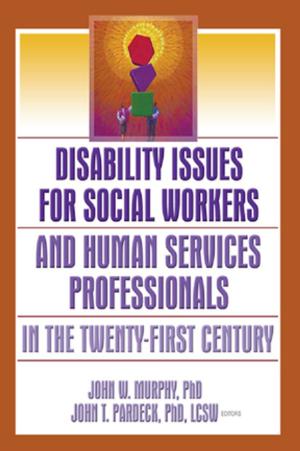Social and Community Informatics
Humans on the Net
Business & Finance, Management & Leadership, Management Science, Industries & Professions, Information Management, Human Resources & Personnel Management, Organizational Behavior| Author: | Gunilla Bradley | ISBN: | 9781134177769 |
| Publisher: | Taylor and Francis | Publication: | January 24, 2007 |
| Imprint: | Routledge | Language: | English |
| Author: | Gunilla Bradley |
| ISBN: | 9781134177769 |
| Publisher: | Taylor and Francis |
| Publication: | January 24, 2007 |
| Imprint: | Routledge |
| Language: | English |
As a discipline, Informatics has developed over the years from its initial focus on data processing and software development, towards a more recent emphasis on people’s use of technology and its impact on their working and private lives. Gunilla Bradley, an internationally recognized expert in this field, has researched this area for many years and here, authors this indispensable volume on the topic.
Providing a broad and deep analysis of the relationship between people, ICT, society and the environment, Bradley examines the impact on/change in organizations and individuals, both in the workplace and in the home. Taking a firmly humanistic view she also looks to the future as ICT increasingly transforms and impacts on our lives, and explores issues including stress, power, competence and psychosocial communication. She proposes normative research questions for the future and presents actions to achieve the Good ICT society.
This thought-provoking book will be of interest to students and academics studying social informatics, computing and MIS as well as organizational behaviour, sociology, psychology and communications. Research-based and cross-disciplinary, Bradley's book is a valuable, and topical, resource.
As a discipline, Informatics has developed over the years from its initial focus on data processing and software development, towards a more recent emphasis on people’s use of technology and its impact on their working and private lives. Gunilla Bradley, an internationally recognized expert in this field, has researched this area for many years and here, authors this indispensable volume on the topic.
Providing a broad and deep analysis of the relationship between people, ICT, society and the environment, Bradley examines the impact on/change in organizations and individuals, both in the workplace and in the home. Taking a firmly humanistic view she also looks to the future as ICT increasingly transforms and impacts on our lives, and explores issues including stress, power, competence and psychosocial communication. She proposes normative research questions for the future and presents actions to achieve the Good ICT society.
This thought-provoking book will be of interest to students and academics studying social informatics, computing and MIS as well as organizational behaviour, sociology, psychology and communications. Research-based and cross-disciplinary, Bradley's book is a valuable, and topical, resource.















